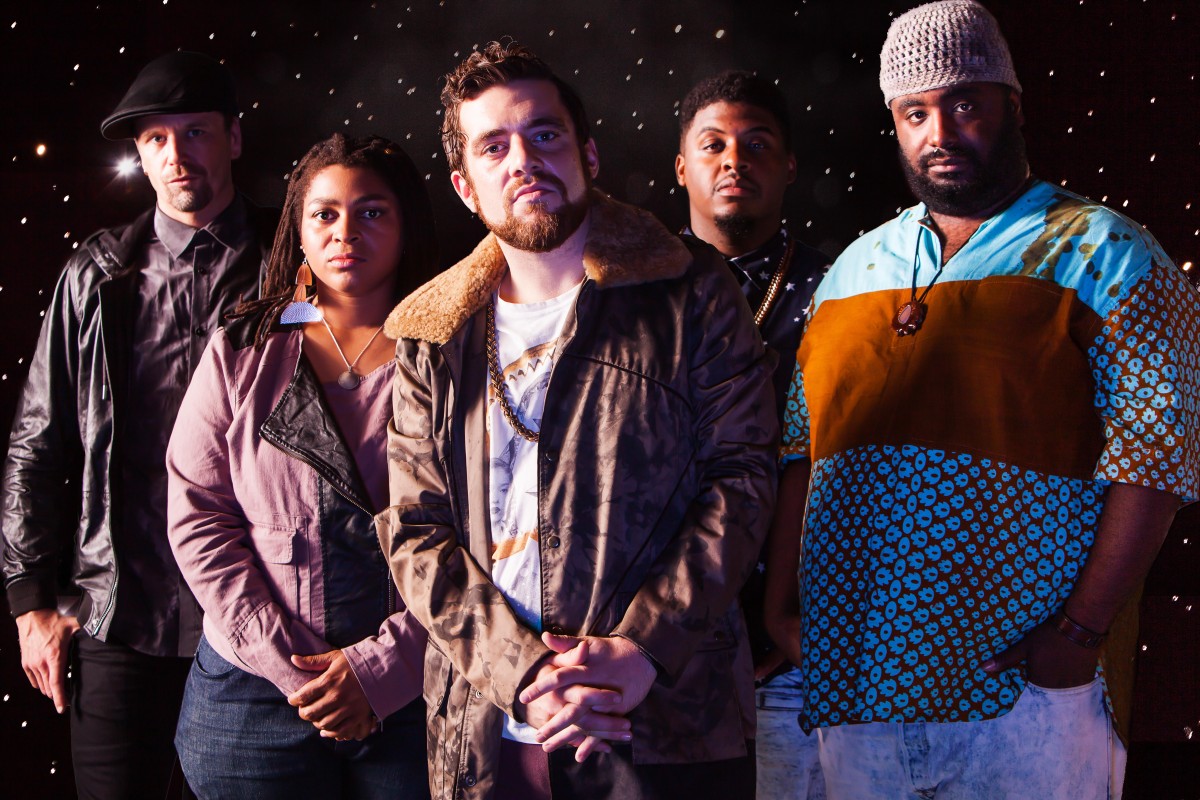Spotlight: The Nth Power

The Nth Power were quickly branded as a parttime supergroup when they first emerged in 2012, but it didn’t take long for the funk outfit to solidify into something more formal—and permanent. The brainchild of Nikki Glaspie, the project started as a fun excuse for the then-Dumpstaphunk drummer/singer to play authentic soul and R&B with friends like percussionist Weedie Braimah, guitarist/singer Nick Cassarino, John Brown’s Body bassist Nate Edgar and singer/keyboardist/Lettuce associate Nigel Hall.
Glaspie, a Virginia native and Berklee College of Musictrained drummer, already had an impressive résumé by the time the group came together. She came of age playing at the Boston café Wally’s, where she joined the same community of funky, improvisational-leaning musicians that produced Lettuce and Soulive. She later clocked time as Beyoncé’s drummer from 2006-2011 and has shared the stage with other modern luminaries, such as Chaka Khan, Jay Z, Kanye West, Destiny’s Child and George Michael. Meanwhile, she also performed with the Sam Kininger Band and Dumpstaphunk, which turned her into a familiar face on the jam and festival circuits.
Though the members of The Nth Power all originally rallied around funk music, Glaspie says that the band was quickly able to explore some new terrain thanks to Braimah, who is a 100-plus generation djembe player. His unusual rhythmic structures give the group a unique African polyrhythmic vibe that distinguishes The Nth Power from many of their groove-funk peers. And though The Nth Power are worlds away from Christian rock stylistically, religion and spirituality do play important roles in their sound.
“Faith is a huge part of the writing process because we have to believe that we’ll write something that will be incredible,” says Cassarino. “It’s almost like an expectation, without being arrogant or entitled, but it’s understood that it’ll happen, and when we surrender to that, it always happens. Surrender is the name of the game.”
Glaspie, who remains the band’s driving force, echoes those sentiments. “I talk to what I call God,” she says. “Other people call it a higher power or Mother Earth or whatever. I talk to the higher power whenever I can, literally, just like I’m talking to you. A lot of people think prayer has to be this whole ritual thing, but it’s not like that for me. I don’t know what it’s like for other people, but for me, it’s a direct connection. I don’t have to go through a church or temple to talk to my person.”
Braimah lost his mother last year. She was a Christian, and his father was a Muslim who adhered to the traditional African belief systems. With regard to the spiritual power of The Nth Power, Braimah says: “By the time you leave the show, we’ve prayed that you had some spiritual relief, no matter if you’ve lost a parent or had a bad day.” He pauses for emphasis and adds: “Music is the only thing I know that’s keeping me on like this.”
When she left Beyoncé’s band, Glaspie said that she wanted to focus on her own music and first love—funk—so it wasn’t a surprise that the drummer stepped down from her Dumpstaphunk post in 2014 to focus on The Nth Power full time.
The group returned to New Orleans, where a late-night Jazz Fest jam session first brought them together, and laid down tracks at the Music Shed, an esteemed Garden District recording studio that’s hosted acts such as Janelle Monáe, Earth, Wind & Fire and R.E.M., as well as NOLA greats like Dr. John, Kermit Ruffins and Trombone Shorty. Ira Schickman, an industry veteran who’s worked with a wide range of artists, from Chaka Khan to NSYNC, signed on as the album’s producer.
However, as they were finishing 2015’s Abundance, Hall abruptly parted ways with the band, under strange circumstances that he has only described as “business stuff.” When asked to elaborate, he emphasizes that he loves everyone in the band and “everything happens for a reason.” Hall does appear on Abundance and released his own solo debut around the same time.
The Nth Power quickly moved forward, replacing Hall with Courtney Smith, who had been playing in another group alongside Braimah. Before joining the outfit, Smith was the musical director of a church in St. Louis and has already brought a new gospel touch to the band. According to Braimah, Smith was their first call after Hall left. “Nigel is a historian and a musical genius when it comes to funk music, but in the next 10 years, you’ll be reading about Courtney being the greatest musician of our time,” he says.
The departure of Hall, who shared vocal duties with Glaspie and Cassarino, has also shifted the latter musician’s role to more of a true frontman, which allows the onstage dynamics to be less of a competition for the spotlight. Smith, who is the youngest member by a few years, emphasizes that point, adding that Cassarino has taken him under his wing, helping to create a more casual feel onstage.
While their spiritual foundation is a key to The Nth Power’s music, for Glaspie, the goal is simple: spread love.
“We don’t have clean water or air or food,” she says. “We have love. That’s the only thing as human beings we can do for each other. I can’t give you clean water or clean air, but I can give you love. [I can give you] something spiritual that you can take with you to use and share. That’s the whole idea—to spread love worldwide.”



















